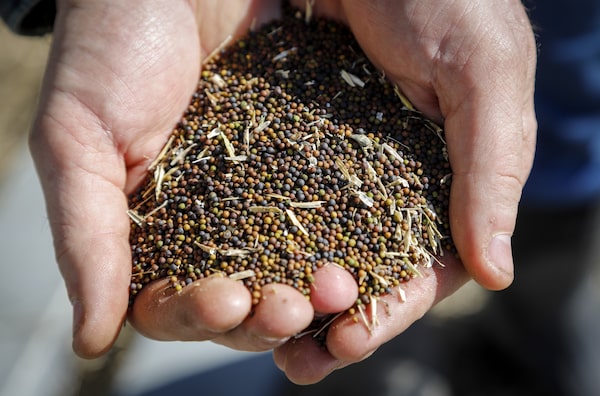
Canola grower David Reid checks on his storage bins full of last year's crop of canola seed on his farm near Cremona, Alta., on March 22, 2019. China's government has blocked imports of canola seed from a second major Canadian exporter, Viterra Inc.Jeff McIntosh/The Canadian Press
China’s expanded ban on Canadian canola seed imports has sent prices of the oilseed tumbling and farmers scrambling to find new buyers as China’s trade action against Canada escalates.
Viterra Inc. is the second Canadian company to have its canola-seed export rights revoked, after China’s General Administration of Customs halted shipments from Richardson International Ltd. earlier this month. And Chinese importers have also stopped all purchases of canola from Canadian producers, according to industry group Canola Council of Canada.
Canola seeds, used to make cooking oil, animal feed and biofuels, represent 17 per cent of all Canadian exports to China – trade worth $2.7-billion in 2018 in a sector that employs 250,000 Canadians.
Prime Minister Justin Trudeau, who met with Richardson officials in Winnipeg on Tuesday, told reporters that his government is taking the issue “very seriously” and is considering sending a delegation to China.
The canola-seed ban is the latest development in a continuing trade and political dispute between Canada and China that started with the arrest of Huawei chief financial officer Meng Wanzhou last year.
Chinese customs said in a statement Tuesday that Viterra’s export registration was cancelled because of pests found in samples taken from the company’s cargoes. The same reason was provided when Richardson’s imports were blocked earlier this month.
Jean-Marc Ruest, senior vice-president of corporate affairs and general counsel at Richardson International, called the claim about pests unsubstantiated.
“It’s looking more and more like this is a non-tariff barrier that’s being raised against Canada,” Mr. Ruest said in an interview on Tuesday. He added that Richardson chief executive Curt Vossen and Hartley Richardson, the CEO and chairman of its parent company, met with Mr. Trudeau and International Trade Minister Jim Carr on Tuesday.
"They thought that the Prime Minister and Minister Carr understood the seriousness of the issues and seemed to show the commitment we need to get this resolved.”
Chinese processors have ceased buying from all Canadian canola shippers because they are concerned about possible losses if the Chinese government blocks shipments, said one industry source who is not authorized to speak publicly on the matter. The source said the Chinese buyers cancelled their Canadian contracts in March, paying a fee to do so.
A spokesperson for Viterra said the company is working closely with Ottawa and the Canola Council of Canada to get more information about the situation.
“All of our export products are tested to ensure they meet specific import standards," the spokesperson said in an e-mail. “We take quality concerns seriously and support a sound, science-based approach in the testing of our exports. Market access issues such as this one hurt our industry and Canadian farmers.”
China buys enough Canadian canola seed in a year – five million tonnes – to fill a train stretching from Vancouver to Calgary, said Brian Innes, the industry group’s vice-president of public affairs.
“Without that market, that is a huge hole to fill,” Mr. Innes said by phone.
The canola group is urging the federal government to resolve the impasse quickly, and wants to accompany the Canadian delegation to China in order to provide technical assistance to reopen markets to exports.
Mr. Innes would not speculate if the impasse is retribution for the arrest of the Huawei executive.
“We are perplexed why the Chinese are expressing concerns about [crop disease] blackleg when we already have an agreement in place to have stable canola trade until the end of March, 2020,” Mr. Innes said. “We are perplexed how our canola can be great quality in December, but not now. We’re perplexed how the rest of our international customers are satisfied with the high quality we provide and all of a sudden concerns have arisen in China.”
The news has sent canola prices tanking, exacerbating problems for farmers already facing lower prices and a glut of supply. The May canola futures contract closed at US$451.70 on Tuesday, down roughly 9 per cent since the start of the year.
Opinion: Canada’s trade reputation takes a hit in Asia
Opinion: Canada must develop a backbone in its dealings with China
The price decline could prompt other importers – such as Japan, Mexico, Pakistan and the United Arab Emirates – to scale up their purchases, said Neil Townsend, chief analyst at Winnipeg-based FarmLink Marketing Solutions.
“The question is whether they’ll be able to buy enough to compensate for the loss of demand from China."
Some growers are concerned that the ban could expand to other agricultural products, as well, said Ken Ball, a senior commodity futures adviser at PI Financial in Winnipeg.
“They’ve chosen canola because it’s kind of the marquee export product for Canada in the agricultural world," said Mr. Ball, adding: “They might choose to stop importing any Canadian products.”
With files from Reuters
 Alexandra Posadzki
Alexandra Posadzki Eric Atkins
Eric Atkins